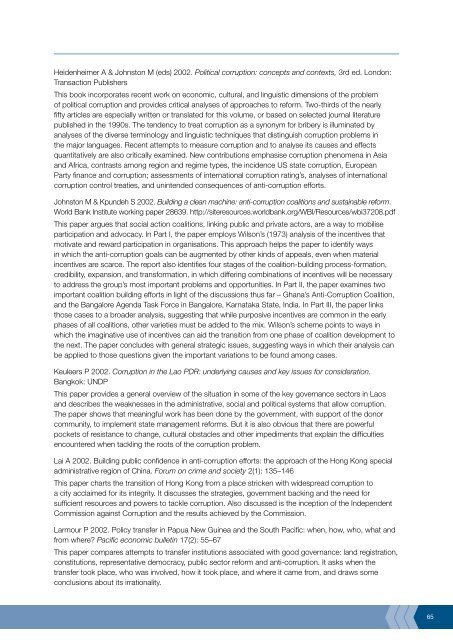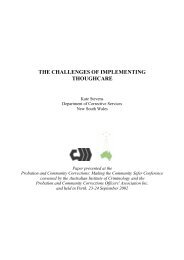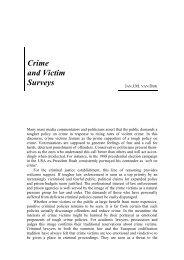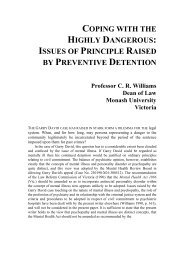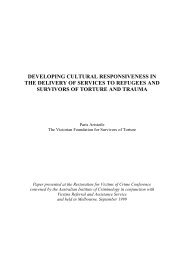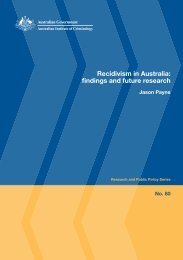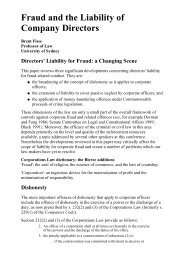Review of anti-corruption strategies Rob McCusker - Australian ...
Review of anti-corruption strategies Rob McCusker - Australian ...
Review of anti-corruption strategies Rob McCusker - Australian ...
You also want an ePaper? Increase the reach of your titles
YUMPU automatically turns print PDFs into web optimized ePapers that Google loves.
Heidenheimer A & Johnston M (eds) 2002. Political <strong>corruption</strong>: concepts and contexts, 3rd ed. London:<br />
Transaction Publishers<br />
This book incorporates recent work on economic, cultural, and linguistic dimensions <strong>of</strong> the problem<br />
<strong>of</strong> political <strong>corruption</strong> and provides critical analyses <strong>of</strong> approaches to reform. Two-thirds <strong>of</strong> the nearly<br />
fifty articles are especially written or translated for this volume, or based on selected journal literature<br />
published in the 1990s. The tendency to treat <strong>corruption</strong> as a synonym for bribery is illuminated by<br />
analyses <strong>of</strong> the diverse terminology and linguistic techniques that distinguish <strong>corruption</strong> problems in<br />
the major languages. Recent attempts to measure <strong>corruption</strong> and to analyse its causes and effects<br />
qu<strong>anti</strong>tatively are also critically examined. New contributions emphasise <strong>corruption</strong> phenomena in Asia<br />
and Africa, contrasts among region and regime types, the incidence US state <strong>corruption</strong>, European<br />
Party finance and <strong>corruption</strong>; assessments <strong>of</strong> international <strong>corruption</strong> rating’s, analyses <strong>of</strong> international<br />
<strong>corruption</strong> control treaties, and unintended consequences <strong>of</strong> <strong>anti</strong>-<strong>corruption</strong> efforts.<br />
Johnston M & Kpundeh S 2002. Building a clean machine: <strong>anti</strong>-<strong>corruption</strong> coalitions and sustainable reform.<br />
World Bank Institute working paper 28639. http://siteresources.worldbank.org/WBI/Resources/wbi37208.pdf<br />
This paper argues that social action coalitions, linking public and private actors, are a way to mobilise<br />
participation and advocacy. In Part I, the paper employs Wilson’s (1973) analysis <strong>of</strong> the incentives that<br />
motivate and reward participation in organisations. This approach helps the paper to identify ways<br />
in which the <strong>anti</strong>-<strong>corruption</strong> goals can be augmented by other kinds <strong>of</strong> appeals, even when material<br />
incentives are scarce. The report also identifies four stages <strong>of</strong> the coalition-building process-formation,<br />
credibility, expansion, and transformation, in which differing combinations <strong>of</strong> incentives will be necessary<br />
to address the group’s most important problems and opportunities. In Part II, the paper examines two<br />
important coalition building efforts in light <strong>of</strong> the discussions thus far – Ghana’s Anti-Corruption Coalition,<br />
and the Bangalore Agenda Task Force in Bangalore, Karnataka State, India. In Part III, the paper links<br />
those cases to a broader analysis, suggesting that while purposive incentives are common in the early<br />
phases <strong>of</strong> all coalitions, other varieties must be added to the mix. Wilson’s scheme points to ways in<br />
which the imaginative use <strong>of</strong> incentives can aid the transition from one phase <strong>of</strong> coalition development to<br />
the next. The paper concludes with general strategic issues, suggesting ways in which their analysis can<br />
be applied to those questions given the important variations to be found among cases.<br />
Keuleers P 2002. Corruption in the Lao PDR: underlying causes and key issues for consideration.<br />
Bangkok: UNDP<br />
This paper provides a general overview <strong>of</strong> the situation in some <strong>of</strong> the key governance sectors in Laos<br />
and describes the weaknesses in the administrative, social and political systems that allow <strong>corruption</strong>.<br />
The paper shows that meaningful work has been done by the government, with support <strong>of</strong> the donor<br />
community, to implement state management reforms. But it is also obvious that there are powerful<br />
pockets <strong>of</strong> resistance to change, cultural obstacles and other impediments that explain the difficulties<br />
encountered when tackling the roots <strong>of</strong> the <strong>corruption</strong> problem.<br />
Lai A 2002. Building public confidence in <strong>anti</strong>-<strong>corruption</strong> efforts: the approach <strong>of</strong> the Hong Kong special<br />
administrative region <strong>of</strong> China. Forum on crime and society 2(1): 135–146<br />
This paper charts the transition <strong>of</strong> Hong Kong from a place stricken with widespread <strong>corruption</strong> to<br />
a city acclaimed for its integrity. It discusses the <strong>strategies</strong>, government backing and the need for<br />
sufficient resources and powers to tackle <strong>corruption</strong>. Also discussed is the inception <strong>of</strong> the Independent<br />
Commission against Corruption and the results achieved by the Commission.<br />
Larmour P 2002. Policy transfer in Papua New Guinea and the South Pacific: when, how, who, what and<br />
from where? Pacific economic bulletin 17(2): 55–67<br />
This paper compares attempts to transfer institutions associated with good governance: land registration,<br />
constitutions, representative democracy, public sector reform and <strong>anti</strong>-<strong>corruption</strong>. It asks when the<br />
transfer took place, who was involved, how it took place, and where it came from, and draws some<br />
conclusions about its irrationality.


